 |
 |
 |
| |
Nutritional Intervention with NR100157 Restores Gut Microbiota in HIV-1-infected Adults Not on HAART and Reduces Systemic Immune Activation
|
| |
| |
Mario Clerici*1, A Gori2, G Rizzardini3, C Richter4, I van den Ende5, B van't Land6,7, N Georgiou6,7, J Knol6, J Garssen6,7, and J Lange8
1Univ of Milan, Italy; 2San Gerardo Hosp, Monza, Italy; 3Luigi Sacco Hosp, Milan, Italy; 4Rijnstate Hosp, Arnhem, The Netherlands; 5Erasmus Med Ctr, Rotterdam, The Netherlands; 6Danone Res Ctr for Specialized Nutrition, Wageningen, The Netherlands; 7Utrecht Inst for Pharmaceutical Sci, Utrecht Univ, The Netherlands; and 8Academic Med Ctr, Amsterdam, The Netherlands
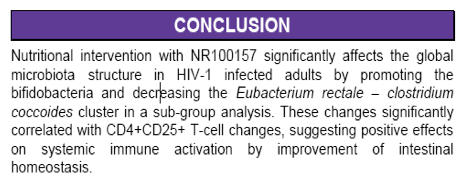
ABSTRACT
Background: A compromised gastrointestinal tract can contribute via microbial translocation to the persistent chronic immune activation observed in HIV-infected individuals. Previously, the nutritional concept NR100157 containing prebiotic oligosaccharides was shown to reduce CD4+ T cell decline in HIV-1-infected adults, in the double-blind placebo controlled BITE trial, after 52 weeks intervention. This was associated with decreased immune activation in a subpopulation. In this study we analyzed changes in microbiota and correlated these to immune activation.
Methods: HIV-1+ adults (men and women) not on HAART (n = 340) were included in the BITE trial, across 8 countries worldwide. Subjects received either the nutritional concept NR100157 or an isocaloric and isonitrogenous control for 52 weeks. In 2 exploratory substudies, stool and blood samples were collected at baseline, week 26, and week 52. Gut microbiota composition was studied by FISH analysis (n = 24) and immune activation by measuring CD4+CD25+ and CD8+CD38+ T cells (n = 20). Differences in changes over time were analyzed using repeated measures mixed model or Mann-Whitney test. Associations between changes in gut microbiota composition and immune activation were measured using Spearman correlation.
Results: Gut microbiota composition was significantly affected by the intervention, showing increased levels of Bifidobacteria and the Atopobium cluster (p = 0.011 and p <0.001) and decreased levels of the Eubacterium rectale-Clostridium coccoides cluster (p = 0.009) in the active group compared to control at week 26. Percentage of CD4+CD25+ T cells, was significantly decreased from baseline to week 26 and week 52 in the active group compared to control (p = 0.006 and p = 0.048). Changes in Bifidobacteria were negatively correlated with changes in immune activation (%CD4+CD25+) at week 26 (rs = -0.774, p =0.005; n = 11) and changes in the Eubacterium rectale-Clostridium coccoides cluster were positively correlated with changes in %CD4+CD25+ at week 26 (rs = 0.866, p = 0.001; n = 11). Changes in the Atopobium cluster were negatively correlated with changes in %CD4+CD25+ at week 52 (rs = -0.754, p =0.005; n = 12).
Conclusions: This study shows that nutritional intervention with NR100157 beneficially affects the gut microbiota composition in HIV-1-infected adults. Microbiota changes correlated with CD4+CD25+ T cell changes in a subgroup analysis, implying positive effects of NR100157 on intestinal homeostasis and systemic immune activation.
INTRODUCTION
A compromised gastrointestinal tract can contribute to the persistent chronic immune activation observed in HIV infected individuals. Previously, in the double-blind placebo-controlled BITE trial, the nutritional concept NR100157 containing prebiotic oligosaccharides was shown to reduce CD4+ T-cell decline in HIV-1 infected adults, after 52 weeks intervention1. This was associated with decreased immune activation in a patient sub-population.
In the present study, we analyzed microbiota changes in a subpopulation and correlated the changes to immune activation parameters (CD4+CD25+ and CD8+CD38+ T-cells) in subjects that participated in both sub-studies.
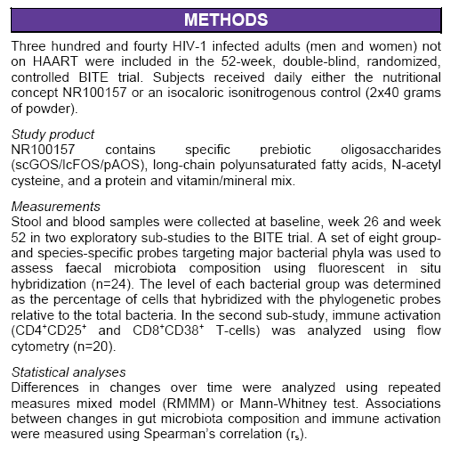
RESULTS
Intervention with NR100157 significantly reduces immune activation (CD4+CD25+) and concomitantly modulates the gut microbiota structure.
Immune activation
Immune activation was reduced after intake of NR100157, as shown by a decreasing percentage of activated CD4+ T-cells (CD4+CD25+) from baseline to week 26 (p=0.006) and from baseline to week 52 (p=0.048) in the active group vs. control (Fig. 1A). Activated CD8+ T-cells were reduced in the active group, even though these changes did not reach statistical significance (Fig. 1B).
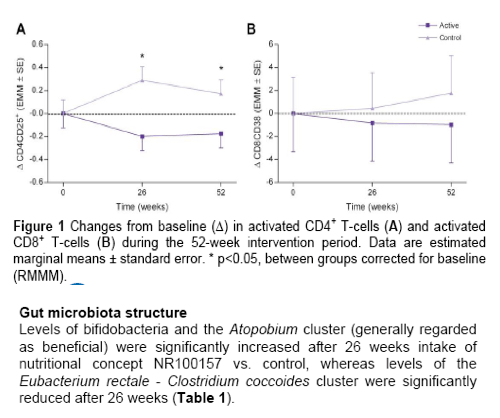
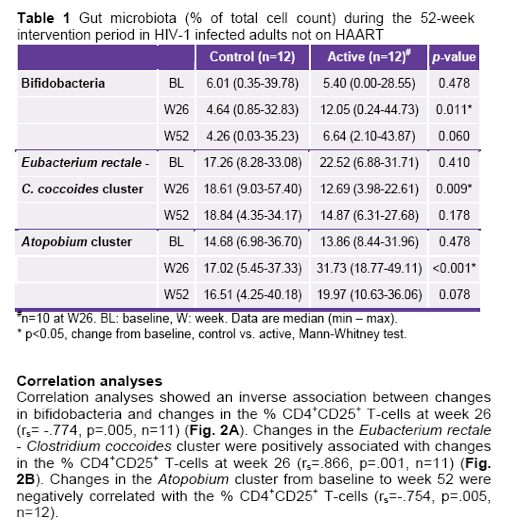
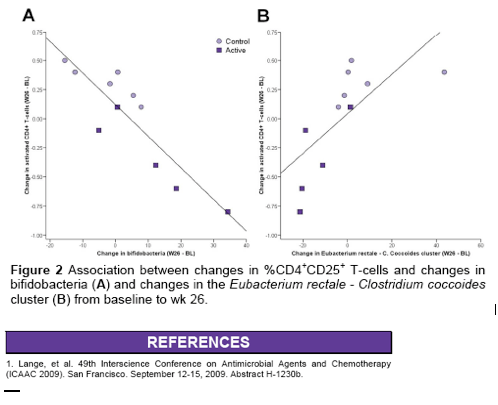
|
| |
|
 |
 |
|
|